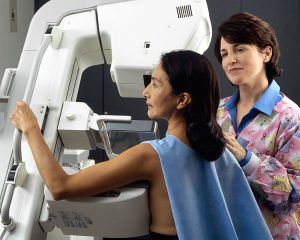The importance of mammogram exams has been highly publicized for decades, so much that it’s become the main focus of October’s Breast Cancer Awareness month. Less notoriety has been given an equally important screening tool for women over 65—bone density scans. Many gynecologists are now addressing this shortcoming.

The Benefits of Mammograms
New digital imaging technologies have dramatically improved mammography’s accuracy. X-ray film is passe’. Nearly all hospitals and imaging centers in the U.S. now capture breast X-rays on digital systems, interpreting those images on high-resolution video monitors. To the patient, nothing seems to have changed. The imaging device looks the same and breast compression is (unfortunately) still required. However, digital screening mammography’s dramatic improvement in finding early-stage breast cancer means that treatment can start earlier, possibly before the cancer spreads. Gynecologists and mammographers agree the short discomfort of compression is far outweighed by this tool’s immense value in early breast cancer detection.
Importance of Bone Density
Like mammography, a scan called a DXA (Dual Energy X-ray Absorptiometry) is a radiology procedure. However, its goal is not cancer screening but to determine the risk of a disease called osteoporosis, a decrease in bone mass and density leading to a predisposition to fractures. It’s especially common in women following menopause. Estrogen produced in the body typically maintains bone density. With aging and menopause, estrogen decreases which can result in a 25-30% loss of bone density. A bone density exam is recommended by gynecologists for women aged 65 and older, or for younger postmenopausal women with osteoporosis risk factors including smoking, excessing alcohol or caffeine use, low body weight, or history of adult bone fractures, among others.
Gynecologists are now informing patients within the recommended criteria to consider a bone density exam when arranging an annual mammogram, typically in October. The gynecologist will advise if an individual patient needs this test, which only involves lying on an X-ray table…thankfully, no compression.
Carthage Area Hospital has the latest imaging equipment encompassing both screening modalities. Contact them for an appointment.
